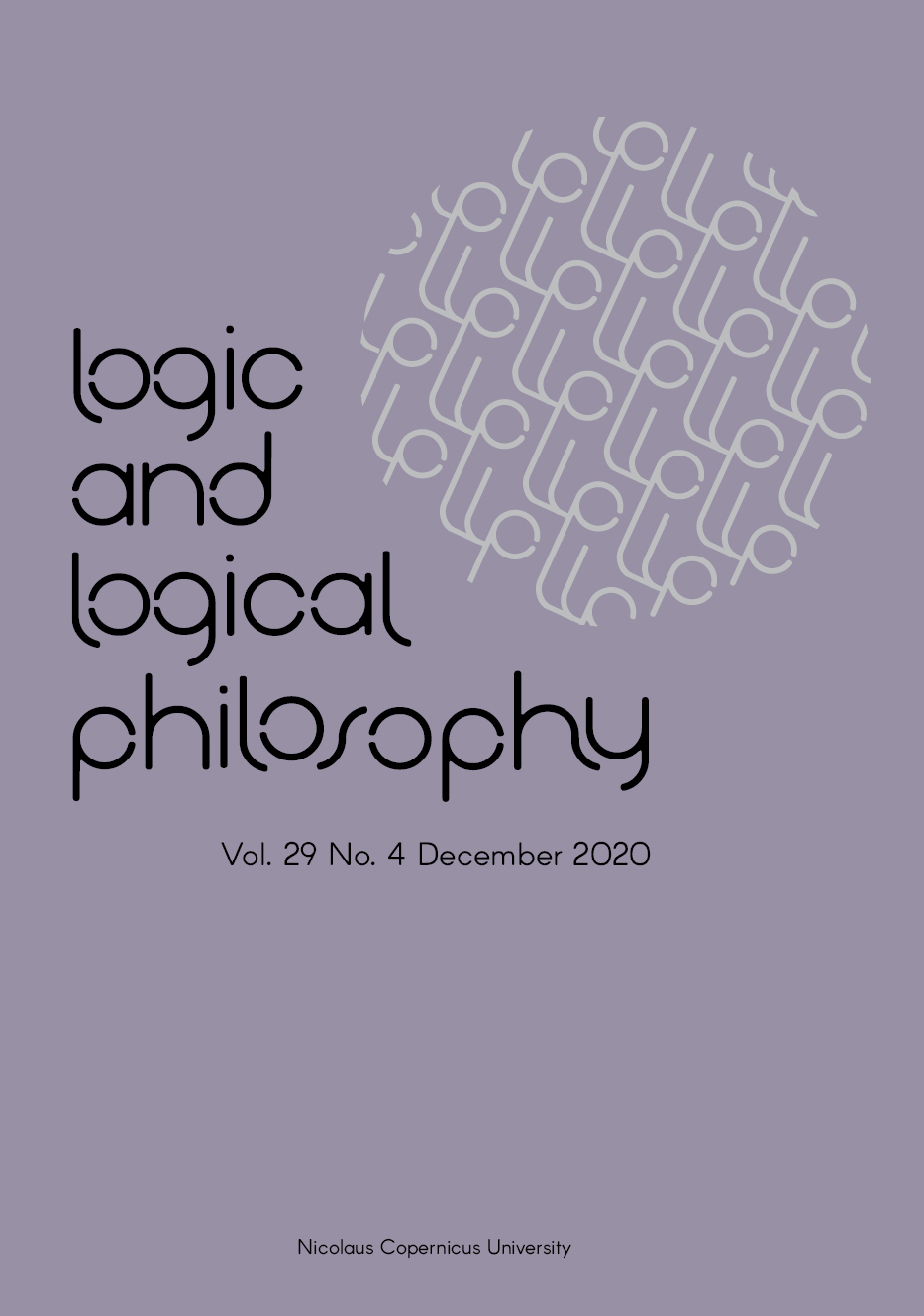Kilwardby's 55th Lesson
DOI:
https://doi.org/10.12775/LLP.2020.013Keywords
connexive logic, Kilwardby, Aristotle’s ThesisAbstract
In “Lectio 55” of his Notule libri Priorum, Robert Kilwardby discussed various objections that had been raised against Aristotle’s Theses. The first thesis, AT1, says that no proposition q is implied both by a proposition p and by its negation, ∼p. AT2 says that no proposition p is implied by its own negation. In Prior Analytics, Aristotle had shown that AT2 entails AT1, and he argued that the assumption of a proposition p such that (∼p → p) would be “absurd”.
The unrestricted validity of AT1, AT2, however, is at odds with other principles which were widely accepted by medieval logicians, namely the law Ex Impossibili Quodlibet, EIQ, and the rules of disjunction introduction. Since, according to EIQ, the impossible proposition (p ∧ ∼p) implies every proposition, it also implies ∼(p∧∼p), in contradiction to AT2. Furthermore, by way of disjunction introduction, the proposition (p∨∼p) is implied both by p and by ∼p, in contradiction to AT1.
Kilwardby tried to defend AT1, AT2 against these objections by claiming that EIQ holds only for accidental but not for natural implications. The second argument, however, cannot be refuted in this way because Kilwardby had to admit that every disjunction (p ∨ q) is naturally implied by its disjuncts. He therefore introduced the further requirement that, in order to constitute a genuine counterexample to AT1, (p → q) and (∼p → q) have to hold “by virtue of the same thing”.
In a recently published paper, Spencer Johnston accepted this futile defence of AT1 and developed a formal semantics that would fit Kilwardby’s presumably connexive implication. This procedure, however, is misguided because the remaining considerations of Lesson 55 which were entirely ignored by Johnston show that Kilwardby eventually recognized that AT2 is bound to fail. After all he concluded: “So it should be granted that from the impossible its opposite follows, and that the necessary follows from its opposite”.
References
Barnes, Jonathan (ed.), The Complete Works of Aristotle (The Revised Oxford Translation), Vol. 2, Oxford 2009.
Johnston, Spencer, “Per se modality and natural implication. An account of connexive logic in Robert Kilwardby”, Logic and Logical Philosophy 28, 3 (2019): 449–479. DOI: http://dx.doi.org/10.12775/LLP.2019.033
Kapsner, Andreas, “Humble connexivity”, Logic and Logical Philosophy 28, 3 (2019): 513–536. DOI: http://dx.doi.org/10.12775/LLP.2019.001
Kneale, William and Martha, The Development of Logic, Clarendon: Oxford 1962.
Lenzen, Wolfgang, “Leibniz’s laws of consistency and the philosophical foundations of connexive logic”, Logic and Logical Philosophy 28, 3 (2019): 537–551. DOI: http://dx.doi.org/10.12775/LLP.2019.004
Lenzen, Wolfgang, “A critical examination of the historical origins of connexive logic”, History and Philosophy of Logic 40 (2019). DOI: http://dx.doi.org/10.1080/01445340.2019.1650610
Lindner, Nicolas, Ein Vergleich des ‘Cogito’ bei Augustinus und Descartes. Übereinstimmungen und Unterschiede, GRIN Verlag: München 2010. https://www.grin.com/document/165781
McCall, Storrs: “A history of connexivity”, pages 415–449 in D. Gabbay, D. Pelletier and J. Woods (eds.), Handbook of History of Logic, vol. 11, A History of its Central Concepts, Elsevier: Amsterdam 2012. DOI: http://dx.doi.org/10.1016/B978-0-444-52937-4.50008-3
Pizzi, Claudio, and Timothy Williamson, “Strong Boethius’ thesis and consequential implication”, Journal of Philosophical Logic 26 (1997): 569–588. DOI: http://dx.doi.org/10.1023/A:1004230028063
Thom, Paul, and John Scott (eds.): Robert Kilwardby, Notule libri Priorum, (Auctores Britannici Medii Aevi, vol. 23+24), Oxford University Press: Oxford 2015.
Thom, Paul, Robert Kilwardby’s Science of Logic (Investigating Medieval Philosophy, vol. 14), Brill: Leiden 2019. DOI: http://dx.doi.org/10.1163/9789004408777
Thomas, Ivo, “Maxims in Kilwardby”, Dominican Studies VII (1954): 129–164.
Wansing, Heinrich, “Connexive logic”, in E.N. Zalta (ed.), The Stanford Encyclopedia of Philosophy (Fall 2014 Edition). http://plato.stanford.edu/archives/fall2014/entries/logic-connexive/
Downloads
Published
How to Cite
Issue
Section
Stats
Number of views and downloads: 897
Number of citations: 2







